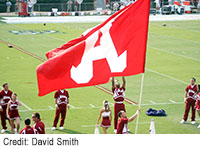 Last Tuesday, The Trademark Trial and Appeal Board (TTAB) upheld a decision to deny Apple’s trademark application to register its music feature mark that’s used on iPhones and other Apple products. The reason? The mark was confusingly similar to another mark that’s now owned by MySpace. Both marks consist of two musical eighth notes on an orange background. MySpace’s mark was originally issued to iLike, a music service that let users download and share music with each other. However, MySpace bought iLike in 2009, and closed it down a few years later.
Last Tuesday, The Trademark Trial and Appeal Board (TTAB) upheld a decision to deny Apple’s trademark application to register its music feature mark that’s used on iPhones and other Apple products. The reason? The mark was confusingly similar to another mark that’s now owned by MySpace. Both marks consist of two musical eighth notes on an orange background. MySpace’s mark was originally issued to iLike, a music service that let users download and share music with each other. However, MySpace bought iLike in 2009, and closed it down a few years later.

Ilana Bergstrom
Ilana Bergstrom is an attorney and member of the Blog Team at Justia. She received her B.A. from the University of Michigan, Ann Arbor, and her J.D. from the University of California, Hastings College of the Law with a concentration in intellectual property law.
![]() Pinterest filed a complaint at the end of August in the Northern District of California against Qian Jin of Nanjing, China, for cyberpiracy, trademark infringement and false designation of origin, trademark dilution, and unfair competition. Specifically, Pinterest claims that Qian purchased dozens of “infringing” domain names that are nearly identical and confusingly similar to pinterest.com, and uses them purely for online advertisements. Pinterest also alleges that Qian applied to register PINTEREST and PINTERESTS as trademarks in the United States in bad faith, stating that he had full knowledge of Pinterest’s brand and services.
Pinterest filed a complaint at the end of August in the Northern District of California against Qian Jin of Nanjing, China, for cyberpiracy, trademark infringement and false designation of origin, trademark dilution, and unfair competition. Specifically, Pinterest claims that Qian purchased dozens of “infringing” domain names that are nearly identical and confusingly similar to pinterest.com, and uses them purely for online advertisements. Pinterest also alleges that Qian applied to register PINTEREST and PINTERESTS as trademarks in the United States in bad faith, stating that he had full knowledge of Pinterest’s brand and services.
 Mary Cesar, the owner of Mary’s Cakes & Pastries in Northport, Alabama, received a cease-and-desist letter last week from Collegiate Licensing Company (CLC) ordering her to stop selling products decorated with the University of Alabama’s trademarks and logos. Specifically, the letter stated she must stop using, “trademarks, names, logos, colors, slogans, mascots, and other indicia associated with the university” with the sale of her baked goods.
Mary Cesar, the owner of Mary’s Cakes & Pastries in Northport, Alabama, received a cease-and-desist letter last week from Collegiate Licensing Company (CLC) ordering her to stop selling products decorated with the University of Alabama’s trademarks and logos. Specifically, the letter stated she must stop using, “trademarks, names, logos, colors, slogans, mascots, and other indicia associated with the university” with the sale of her baked goods.
However, Cesar states that the university itself, as well as its athletic and legal departments, has placed orders for these very same products. She stated that she thought that the university wouldn’t place such orders if she had been doing something illegally.
 On July 19th, Rick Quereshi filed a Notice of Opposition against Twitter’s application for the mark TWEET. Although Twitter applied for trademark protection of TWEET back on April 16, 2009, and the application was published for opposition later that year, Quereshi opposes the registration for the following reasons: 1) Twitter filed its application under an intent to use basis, yet no Allegation of Use has been filed to date; 2) Twitter has not used the TWEET mark in commerce with the identified classes of services from the application; and 3) Quereshi has been openly and notoriously using the TWEET mark in commerce via a mobile computing device since July 23, 2009. Thus, under the doctrine of common law, Quereshi claims ownership of the mark TWEET due to its prior senior use.
On July 19th, Rick Quereshi filed a Notice of Opposition against Twitter’s application for the mark TWEET. Although Twitter applied for trademark protection of TWEET back on April 16, 2009, and the application was published for opposition later that year, Quereshi opposes the registration for the following reasons: 1) Twitter filed its application under an intent to use basis, yet no Allegation of Use has been filed to date; 2) Twitter has not used the TWEET mark in commerce with the identified classes of services from the application; and 3) Quereshi has been openly and notoriously using the TWEET mark in commerce via a mobile computing device since July 23, 2009. Thus, under the doctrine of common law, Quereshi claims ownership of the mark TWEET due to its prior senior use.
